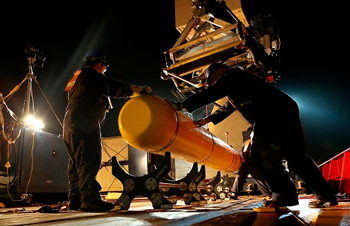
Sydney/Australia, Apr 30: The Australian agency heading up the search for the missing Malaysian jet has dismissed a claim by a resource survey company that it found possible plane wreckage in the northern Bay of Bengal.
The location cited by Australia-based GeoResonance Pty Ltd. is thousands of kilometres north of a remote area in the Indian Ocean where the search for Flight 370 has been concentrated for weeks.
“The Australian led search is relying on information from satellite and other data to determine the missing aircraft's location. The location specified by the GeoResonance report is not within the search arc derived from this data,” the Joint Agency Co-ordination Center, which is heading up the search off Australia's west coast, said in a statement on Tuesday. “The joint international team is satisfied that the final resting place of the missing aircraft is in the southerly portion of the search arc.”
GeoResonance stressed that it is not certain it found the Malaysia Airlines plane which vanished on March 8 during a flight from Kuala Lumpur to Beijing, but called for its findings to be investigated.
The company uses imaging, radiation chemistry and other technologies to search for oil, gas or mineral deposits. In hunting for Flight 370, it used the same technology to look on the ocean floor for chemical elements that would be present in a Boeing 777: aluminum, titanium, jet fuel residue and others.
GeoResonance compared multispectral images taken March 5 and March 10 — before and after the plane's disappearance — and found a specific area where the data varied between those dates, it said in a statement. The location is about 190 kilometres (118 miles) south of Bangladesh.
Malaysian Defence Minister Hishammuddin Hussein said Tuesday that China and Australia were aware of the announcement. “Malaysia is working with its international partners to assess the credibility of this information,” a statement from his office said.
India, Bangladesh and other countries to the north have said they never detected the plane in their airspace. The jet had contact with a satellite from British company Inmarsat for a few more hours, and investigators have concluded from that data that the flight ended in the southern Indian Ocean.
No wreckage from the plane has been found, and an aerial search for surface debris ended Monday after six weeks of fruitless hunting. An unmanned sub is continuing to search underwater in an area where sounds consistent with a plane's black box were detected earlier this month. Additional equipment is expected to be brought in within the next few weeks to scour an expanded underwater area. That search could drag on for eight months.
Earlier:
Australian company says it may have found MH370 wreckage

Kuala Lumpur, Apr 29: An Australian marine exploration company has claimed that it has found the wreckage of the crashed Malaysian plane in the Bay of Bengal, 5,000 km away from the current search location in the Indian Ocean.
Adelaide-based GeoResonance on Tuesday said it had begun its own search for the missing flight MH370 on March 10 and that it has detected possible wreckage in the Bay of Bengal, 5000 km away from the current search location, the Star newspaper reported.
GeoResonance's search covered 2,000,000 square kilometres of the possible crash zone, using images obtained from satellites and aircraft, with company scientists focusing their efforts north of plane's last known location, using over 20 technologies to analyse the data including a nuclear reactor, company spokesperson David Pope said.
He claimed his company used technology originally designed to find nuclear warheads and submarines.
Mr. Pope said GeoResonance compared their findings with images taken on March 5, three days before MH370 went missing, and did not find what they had detected at the spot.
“The wreckage wasn't there prior to the disappearance of MH370. We're not trying to say it definitely is MH370. However, it is a lead we feel should be followed up,” said Mr. Pope.
Malaysia's Department of Civil Aviation Director-General Azharuddin Abdul Rahman told the paper that Malaysia was unaware of the report of the finding.
“We will have to check and verify this report,” he said.
Another GeoResonance spokesperson, Pavel Kursa, said several elements found in commercial airliners were detected at the Bay of Bengal spot identified by GeoResonance.
“We identified chemical elements and materials that make up a Boeing 777...these are aluminium, titanium, copper, steel alloys and other materials,” said Mr. Kursa in a statement.
The Beijing-bound Malaysia Airlines flight MH370- carrying 239 people, including five Indians, an Indo-Canadian and 154 Chinese nationals - had mysteriously vanished on March 8 after taking off from Kuala Lumpur.
The mystery of the missing plane continued to baffle aviation and security authorities who have so far not succeeded in tracking the aircraft despite deploying hi-tech radar and other gadgets.






Comments
Add new comment